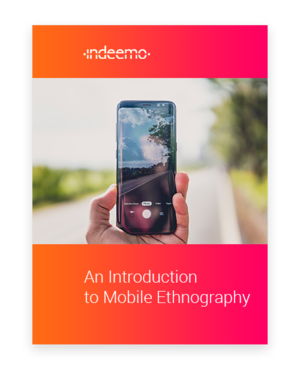Mobile Ethnography White Paper
Learn how Mobile Ethnography can supplement your research projects and generate richer contextual insights for your brands.

Over the past few weeks, we have had a number of clients tell us that they are struggling to recruit millennial respondents to take part in traditional, in-person qualitative research methodologies. If this is part of an emerging trend (which we expect it is), then the following feedback from our friends at Atticus Research on their recent experiences of using Indeemo’s mobile qualitative research app might be of interest for any upcoming projects targeting this demographic.
Millennials are a mobile first generation of consumers. Messaging, social, video, emojis are defaults when it comes to how they communicate, connect and express themselves. If you want to be relevant and connect with them in a manner in which they are comfortable, you need to include mobile in your research toolkit.
And when it comes to mobile, we see Snapchat as the most interesting platform for Online Qualitative Research. Snapchat is popular because, unlike Facebook, it is not an “unforgetting dragnet” of every post, emotion and interaction you share online. It is a place where you can be authentic, spontaneous and real and – hopefully – not have it come back to bite you in years to come.
Ephemeral messaging is the nearest digital equivalent to fading memories. It’s impact on how people communicate has interesting implications for research. It’s empowering a generation to be more natural, spontaneous, authentic and intimate when communicating over mobile. As a result, it means our chances – as researchers – to get closer to in context, in-the-moment, real-life behaviours using mobile as the medium are significantly increased.
We’re long on this belief.
We see it every day in the projects we support.
It’s something our friends at Atticus Research believe too.
Atticus used Indeemo to engage a group of UK millennials who are considering University courses and the insights they uncovered using mobile were compelling.
Millennials can find some synchronous research methods such as focus groups, more intimidating, or be less inclined to really open up and share their views. Some researchers have even tried online focus groups and still report mixed results. Millennials communicate mostly via video and text using asynchronous methods such as WhatsApp or Snapchat. (Read our post on Mobile Ethnography, a viable alternative to Focus Groups).
With some good moderating and simple encouragement, our participants let us into their lives via the app, sharing their thoughts and feelings, hopes and aspirations, fears and concerns: how they perceive their world and their future.
It was interesting seeing the change over the period of the research – they quickly grew in confidence and became more relaxed and confessional. They shared photos, text comments, and selfie video vox pops, that really blew us away – we doubt we would have gained the same rich insight had we used a face-to-face approach.
And what did Atticus discover about Indeemo?
“In fact, it is self-perpetuating and once our participants uploaded their first bit of content, they got hooked and engaged more and more.
It doesn’t feel like hard work – it feels more like fun for the participant.
And they also go on a journey as they learn about themselves or the experiences we are researching.”
“With the dashboard showing uploads in real time, we can react quickly, and encourage further discussion or exploration. We can build a dialogue and keep our respondents interested and engaged – and feeling listened to! Which only encourages more involvement.”
“People talking as they are thinking, being natural and intuitive.
It captures experiences in the moment and avoids post-rationalising decisions and behaviour, and young people in particular are more open and confessional using a non-confrontational and non-judgemental approach like this.”
Mobile qualitative research apps get you closer, especially with millennials.
When supplemented with positive moderation that builds rapport and trust, there is a snowball effect where respondents share more data more openly and the results, we consistently hear, are proving to be compelling.
If you are considering incorporating mobile in an upcoming research project, get in touch. We’d love to share some advice on how to maximise engagement.
Learn how Mobile Ethnography can supplement your research projects and generate richer contextual insights for your brands.
